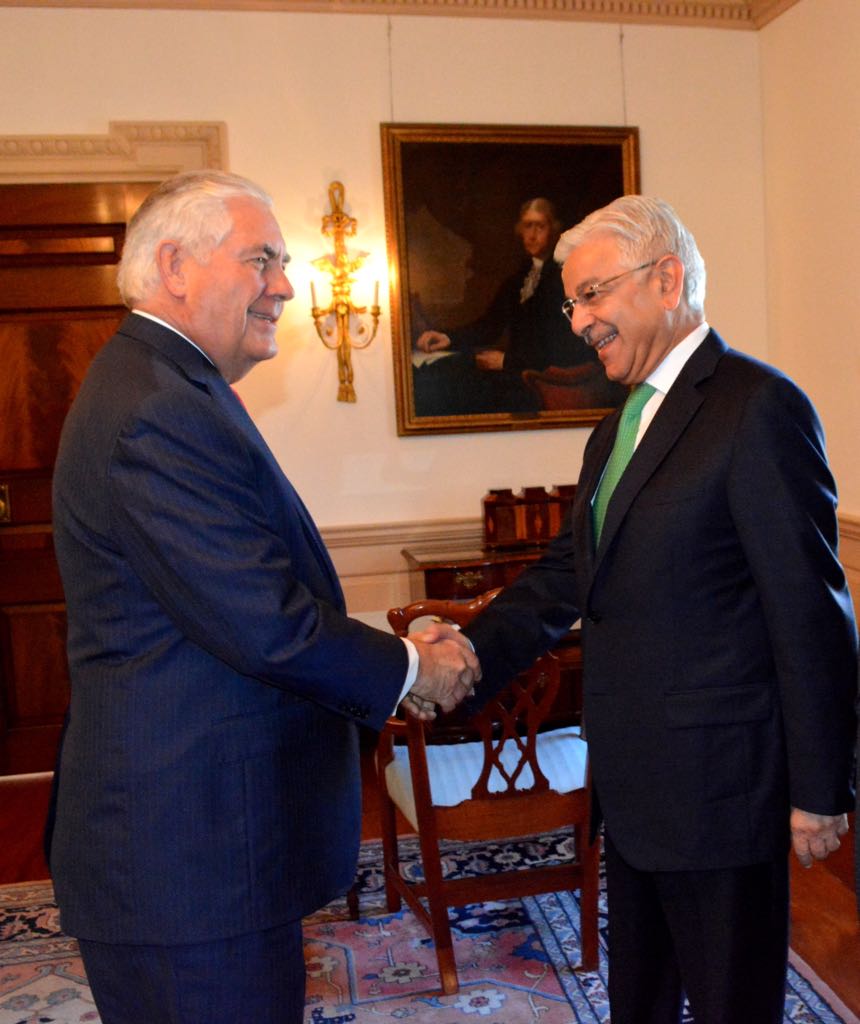Washington DC: Foreign Minister Khawaja Muhammad Asif met U.S. Secretary of State Rex Tillerson at the State Departmentand expressed his concerns about ungoverned spaces within Afghanistan, from which attacks against Pakistan continued to be planned and carried out.
Both leaders discussed bilateral and regional issues of mutual interest, said a statement issued by Foreign Office of Pakistan.
The Foreign Minister, visiting Washington at Secretary Tillerson’s invitation, said that Pakistan and the United States shared a common desire for peace and stability in Afghanistan and the region at large. He emphasized that Pakistan sought a broad based relationship with United States building on a seven decade long history of successful cooperation.
Foreign Minister pointed out that Pakistan is winning its war against terrorism. In contrast to other countries, the incidence of terrorism in Pakistan has seen a marked decline – with a salutary impact on economic and commercial activity. This was made possible because Pakistan has pursued a zero-tolerance and indiscriminate approach in its campaign against all terrorist and militant groups. He informed the Secretary of State with regard to the strong public reaction in Pakistan to the pronouncement of US Administration’s South Asia Policy – based on inadequate recognition of Pakistan’s sterling contribution in the fight against terrorism. He added that in addition to huge human and material cost incurred by Pakistan, our cultural ethos as a moderate state had suffered due to protracted instability in Afghanistan.
Secretary Tillerson acknowledged and appreciated the sacrifices rendered by the people and armed forces of Pakistan in the struggle against terrorism. He agreed that cooperation between Pakistan and the United States in Afghanistan was crucial to achieving durable peace and stability in the region. He remarked that Pakistan’s interests and concerns will be accommodated since its role was critical to President Trump’s South Asia Strategy. He added that future stability of Pakistan was an important element of the Strategy.
The Foreign Minister reiterated Pakistan’s position on the need for an Afghan-led and Afghan-owned political approach to achieving peace and stability in Afghanistan. He conveyed Pakistan’s concerns with regard to ungoverned spaces within Afghanistan, from which attacks against Pakistan continued to be planned and carried out.
The Foreign Minister urged the United States to take note of the gross human rights violations being perpetrated by Indian security forces in Occupied Kashmir. He said peace in South Asia would remain out of reach until the resolution of all longstanding disputes, including the core dispute of Jammu and Kashmir.

Inviting Secretary Tillerson to visit Islamabad to continue their discussions, the Foreign Minister stressed that a broad-based and structured framework for dialogue would best serve the two countries’ mutual interests.
Secretary Tillerson accepted the invitation to visit Pakistan at an early date. Both sides agreed to remain constructively engaged with a view to achieving the shared objectives of peace, stability and economic prosperity in the region.
